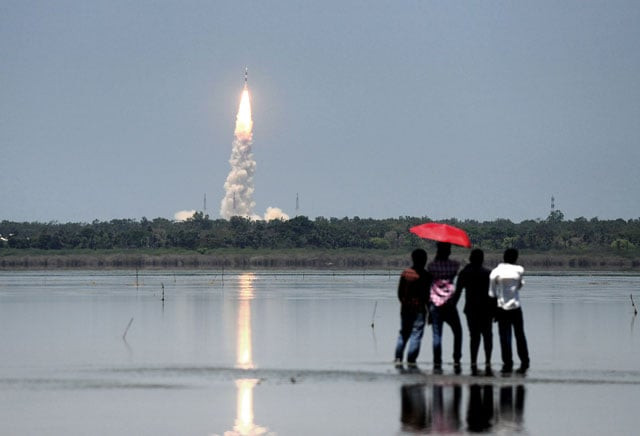India gets homegrown satellite navigation system
System will offer applications for air navigation and can be integrated into mobile phones for use by hikers

Bystanders look on as Indian Space Research Organisation's (ISRO) navigation satellite IRNSS-1G, on board the Polar Satellite Launch Vehicle (PSLV-C33) is launched from Sriharikota in the southern Indian state of Andhra Pradesh on April 28, 2016. PHOTO: AFP
The seventh satellite to make up the Indian Regional Navigation Satellite System (IRNSS) was launched into space via a rocket from Sriharikota spaceport in southwestern India at 12:50 pm IST (0720 GMT).
ISRO launches IRNSS-1G to complete India's own navigational satellite system from Sriharikota. pic.twitter.com/iyjj4HxQb3
— ANI (@ANI) April 28, 2016
However, unlike the widely used United States' Global Positioning System (GPS) or Russia's GLONASS, the Indian system will provide positioning information only in India and 1,500 square kilometres (580 square miles) around its periphery.
'Laser walls' activated along India, Pakistan border
 PHOTO: AFP
PHOTO: AFP"Until now we were dependent on their systems, now we are self-reliant," Prime Minister Narendra Modi said in a televised congratulatory message to scientists at the Indian Space Research Organisation (ISRO).
"With this successful launch, we will determine our own paths powered by our technology. This is a great gift to our people from the scientists," he said.
"Our efforts will help not only India but we can help fellow SAARC (South Asian Association for Regional Cooperation) nations as well."
The system, which will be fully operational in a month's time, offers applications for marine and air navigation and can be integrated into mobile phones for use by hikers or fishermen, for example.
Over the next six months, all the IRNSS satellites will be stabilised in their final orbital positions, ISRO spokesperson Deviprasad Karnik said.
Japan launches satellite to study black holes
A ground control centre in the southern city of Bangalore and tracking stations across the country will monitor the system round the clock.
ISRO scientists have been riding high since an Indian spacecraft successfully reached Mars in 2014 on a shoe-string budget, winning Asia's race to the Red Planet and sparking an outpouring of national pride.
The eight countries that make up SAARC are Afghanistan, Bangladesh, Bhutan, India, Nepal, the Maldives, Pakistan and Sri Lanka.
China and the European Union are both developing global satellite navigation systems.



















COMMENTS
Comments are moderated and generally will be posted if they are on-topic and not abusive.
For more information, please see our Comments FAQ